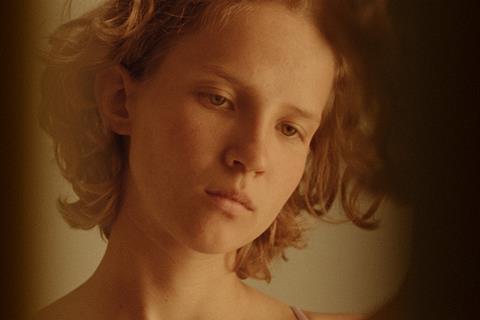A father and his teenage daughter take a roadtrip through rural Russia in this atmospheric debut

Dir/scr: Ilya Povolotsky. Russia. 2023. 119mins
A father and his teenage daughter travel the backwaters of Russia, their home a decrepit van painted in a particularly morose shade of rust-red. They tolerate each other – his casual liaisons with women along the way, her impulsive whims – and co-exist mostly in companionable silence. But over the course of their journey, from Kabardino-Balkaria in the south all the way up to the shores of the White Sea in the northwest, tension builds between them. This is atmospheric, if inscrutable, filmmaking from Ilya Povolotsky, a picture that explores generational tensions and a coming-of-age narrative distinctively and originally.
Athough the story is contemporary, there’s a timelessness to its look
It’s an assured first fiction feature from Povolotsky, whose previous work includes the prize-winning feature-length documentary Froth, about life on the coast of the Barents Sea. Receptiveness for Russian cinema on the festival circuit is impacted by the fallout from the invasion of Ukraine, but the film could eventually resonate with audiences looking to reconnect with cinema from the region.
It’s a sparse story: the silences in the van between the girl (Maria Lukyanova) and her father (Gela Chitava) are matched by the vast, empty spaces that they drive through. And although the living conditions are cramped, we get a sense that a distance is growing between them. At the start of the film, the girl – both characters are unnamed – gets her period for the first time but, unable to confide in her father, is forced to beg for help from the woman who spent the night with her dad. The girl’s mother, it becomes clear, is dead, but she is present with them on their endless journey, her ashes carried in an urn in the van.
It is, the film hints obliquely, an outlaw existence. They buy black market petrol from people selling from canisters by the roadside, they choose their route to avoid police checks and road blocks. They make their money by running a mobile cinema, selling tickets and beer to the locals who turn up to watch screenings of films such as Alexey Balabanov’s 1997 crime movie Brother or Fidelity by Nigina Sayfullaeva (the latter, perhaps not coincidentally, about a father-daughter relationship). Covertly, they also hawk pirated porn on DVDs. It’s a precarious living, and the pair find themselves run out of town on at least one occasion, when their DVDs get into the hands of a group of schoolboys.
Although the story is contemporary, there’s a timelessness to its look: the decision to shoot on film and the sense of a perpetual winter brings a Tarkovsky-esque bleakness to the picture, which is accentuated by the choice of evocatively benighted locations. The film unfolds in despondent truck stops populated by malnourished-looking sex workers, pylon-studded landscapes and an abandoned research station.
This last location is particularly striking, with broken windows like empty eye sockets and a chill wind fitfully rattling the bones of the buildings. It’s here, enraged by her father’s latest conquest, this time with a lonely meteorologist, that the girl makes a bid for independence. And in the aftermath, the balance of power shifts. The silence between them remains, but each has a new understanding of the other.
Production company: Blackchamber
International sales: Blackchamber, cd@blackchamber.ru
Producers: Ivan Nechaev, Ilya Povolotsky
Cinematography: Nikolay Zheludovich
Editing: Aleksandr Kletsov, Ilya Povolotsky
Production design: Zlata Kalmina, Elya Strezhenyuk, Olga Druzhinina
Music: Zurkas Tepla
Main cast: Maria Lukyanova, Gela Chitava
























